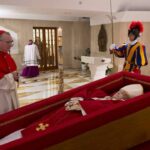CECIL HUNTER WALTER PALMER ‘WANTED TO KILL AN ELEPHANT AFTER KILLING THE LION’
Published on August 1, 2015 at 7:59 AM by FACE OF MALAWI
Walter Palmer, the Minnesota dentist who shot dead Cecil the lion in Zimbabwe, asked to kill a massive elephant after shooting the protected animal – but was unable to find one sufficiently large enough, his guide has exclusively told The Telegraph.
Speaking for the first time since this newspaper revealed that Dr Palmer had fired the arrow that felled the much-loved lion, Theo Bronkhorst has given a detailed account of the July 1 hunt which, he said, went wrong from the start.
On Wednesday, Mr Bronkhorst appeared before magistrates in Hwange, north-western Zimbabwe, and was remanded on bail. He is forbidden from continuing with his hunting business, which he has run since 1992, and has been left devastated by the international fury directed at him since Cecil’s death .
His account of how Cecil came to be killed suggests there was confusion from the outset of Dr Palmer’s trip.
“This hunt… Oh no, it went wrong from the beginning,” Mr Bronkhorst said, speaking from his home in Zimbabwe’s second city of Bulawayo.
“When Dr Palmer arrived in Bulawayo, his luggage was missing and I was dashing around looking for it. So we were late getting ready to go,” he said.
“And we were never meant to hunt on the land where this lion was shot. At the last minute I had to divert from a concession [hunting area] about eight miles away.”
Dr Palmer, an enthusiastic game hunter, paid £35,000 for his permit to shoot a lion.
The killing of Cecil – which had been tagged with a collar as part of a research project run by Oxford University – has caused an international outcry that has forced the dentist into hiding .
The Government expressed its dismay on Thursday, with David Cameron saying that Britain intends to play a “leading role” in fighting the illegal wildlife trade. Grant Shapps, the minister for Africa and former Tory chairman, has written to the Zimbabwean environment minister to call for an Africa-wide ban on “barbaric hunting” in the wake of an act he described as “revolting”.
The land on which Cecil was shot was a farm called Antoinette, which borders Hwange national park. It is currently occupied by Honest Ndlovu – who appeared in court alongside Mr Bronkhorst on Wednesday, but has not been charged with illegal hunting. His lawyer, Tonderai Mukuku said he may have to become a state witness against Mr Bronkhorst.
Rhino poaching in South Africa last year hit a record high, when 1,215 were killed for their horns.
The UN resolution encourages countries to “adopt effective measures to prevent and counter the serious problem of crimes that have an impact on the environment, such as illicit trafficking in wildlife and wildlife products…as well as poaching.”


